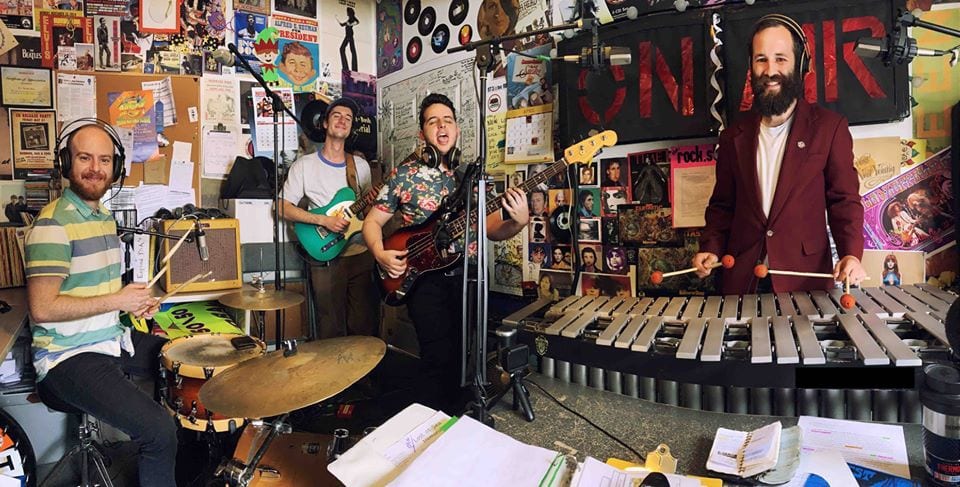By Matt Bieker
It takes real talent to sound as strange as Reno-based Vatican City Fight Club. The foursome met as students at the University of Nevada, Reno’s jazz program and officially formed the band in 2016. Bassist Dave Strawn and vibraphonist Sean Collins were already fans of Rob Ford Explorer—guitarist Cameron Sax and drummer Greg Lewis’ experimental math-rock duo—and were eager to add to the sound. After five years of occasional live shows, the group released their self-titled debut album on April 2—one that is organic, polished and endearingly, impressively weird.
“It took a little while to get it mixed,” Strawn said. “It’s a little, obviously, unorthodox. There are vibraphones and all these gang vocals and drums—and the dynamic ranges of the tunes range from soft, ballad-esque things to, like, just Greg bashing the symbols. So, there was a lot of work to do in that department, but once we got all our eggs in a basket and we were organized about it, we were finally like, ‘Man, let’s just release it already.’”
The band traveled to San Luis Obispo in 2019 to record at Collins’ brother Josh’s home studio and spent 10 days camped out in his house putting the tracks together. (Josh is a featured guitar player on the album, too.) Personal endeavors, like Lewis’ move to Los Angeles for higher music education, and no particular rush on the band’s part delayed the release.
“This album was one of the more honest experiences I’ve ever had playing and writing music.”
“But we still found time to get together and have little FaceTime meetings and send notes back and forth,” Lewis said. “It was a process, but totally worth taking the time that we did, I think.”
The resulting eight tracks do their best to avoid immediate genre-fication. Rob Ford Explorer’s math-rock influence is present throughout, but there are jazzy interludes and straight-up indie jams to be found in equal measure. Sing-along style group vocals, spoken word and pure instrumentalism all find moments on Vatican City Fight Club.
“Everyone always wants to say that it’s weird, so it’s jazz—and this is a really funny thing that we have to deal with as people who like other kinds of interesting music besides jazz,” Collins said. “If ‘indie’ really meant that it was hard to define, then that’s what it would be, because it’s truly just hard to define it. A lot of it is coming from our deep musician selves, and sometimes it’s coming from our deep, emotional selves.”
VCFC’s process can take them to odd places, and their appetite for the experimental is found on tracks like “These Keys”—which also inspired a lovingly-animated music video by Jordan Caroompas. The song starts with the phrenetic, scale-climbing “ping” of the vibraphone, backed by soft, dreamy strings and, eventually, Lewis’ surgically precise percussion. Then Collins begins to babble maniacally before launching into screaming, off-pitch lyrics. (“THESE KEEEEEEEYYYYSSS TELL MY STORRRYYYY…”) It’s surprising, a little off-putting and inexplicably wonderful.
“There’s something about that one in particular that just seems to grab people,” Strawn said. “‘These Keys’ has just infected the minds of so many people. It truly is a little ridiculous.”
Playing with dissonance is a theme that appears again in places like the halting, staccato grooviness of “Fuxed Gear,” or the eerie-yet-comforting group chorus of “Tonopah.” These things that shouldn’t work but do are a result of the band’s musical education—and their attempt to break away from the “rules” of formal composition.
“This ensemble for me, personally, was an opportunity to get away from music school, to get away from that kind of weight of studying music and the pressure of being in a jazz program where there’s an expectation of playing a certain type of way,” Lewis said. “This album was one of the more honest experiences I’ve ever had playing and writing music.”
Perhaps the VCFC’s ethos is best summarized by one phrase in the “about” section of their Facebook page: “Odd meters, odd friends.”
While VCFC’s graduate-level musical pedigree is on full display in their exploration of overlapping rhythms, odd time signatures and progressive song structures, underscoring the whole sound is the sense that the musicians implicitly trust one anothers’ instincts—and they’re having a blast.
“We didn’t really write anything down,” Sax said. “It was more just learning from whoever it was that had the main line to build off of. So, whether it’s in rehearsal or shows, all those tunes just about were learned on the spot and just by talking to each other and listening and playing with each other.”
With the end of the COVID-19 pandemic hopefully on the horizon this year, the members of Vatican City Fight Club hope to hit the road in a few months with any earnings from the album. They haven’t ruled out experimenting with live-streamed or remote shows either.
“A lot of the joy of music comes from exchanging that music with people in-person,” Strawn said. “I think we’re all looking forward to when things are a little more opened up and we can get back to doing that. As a band, we’ve only played like five shows or something, and one of them was when we were recording the album. So, we still have plenty of room to grow as live performers as well.”

